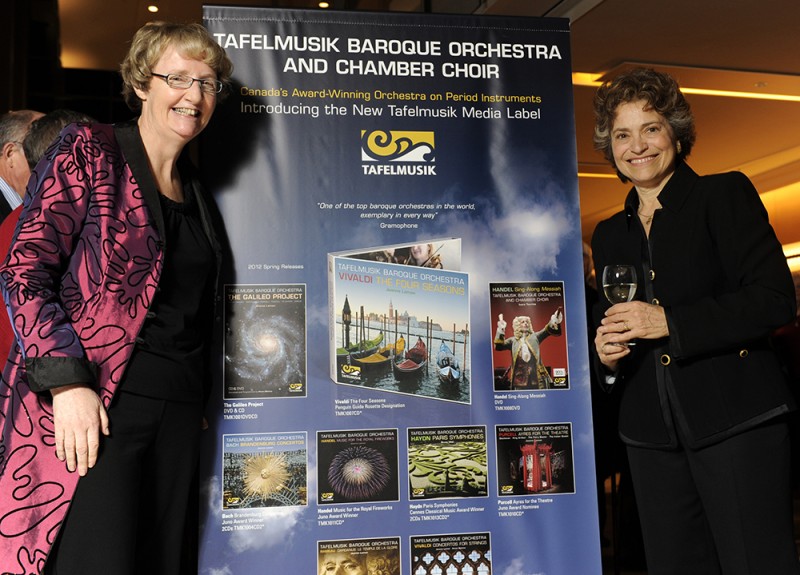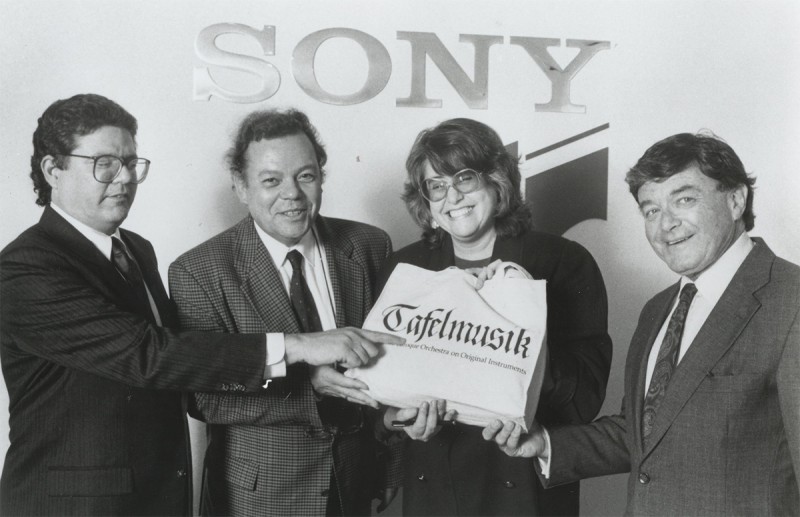Jeanne Lamon worked with only two managing directors at Tafelmusik during her 34-year tenure: Ottie Lockey (1981–2000) and Tricia Baldwin (2000–2014). Ottie and Tricia sat down together to reminisce about working with Jeanne and their years at Tafelmusik.
Tricia Baldwin: Ottie, we were able to see parts of Jeanne that few others knew about. What do you remember most vividly from that daily contact?
Ottie Lockey: Every time I phoned Jeanne in the early 80s (the days before texting or email!), her first words were, “But I’m practising now.” The violin was always attached to her. I STILL remember her patience with all the logistical elements that she needed to filter for the tiny admin team of four. Her talent for seeing the end goal was combined with a keen eye for detail.
The first day of orchestra rehearsals for the 1981/82 season marked the “official” first day on the job for Music Director Jeanne Lamon, principal cellist, Christina Mahler, and General Manager Ottie Lockey. My life partner Eve and I had helped Jeanne and Christina find their first apartment in Toronto. They told me about a job that was available at the office. Suddenly we were dreaming of touring and recording as quickly as possible. Jeanne and I finished each other’s sentences in those days. During coffee breaks we accomplished strategic planning. It was a magical partnership. We were young enough to believe anything was possible. And I knew this bunch of musicians had talent!

TB: Jeanne surrounded herself with remarkable people in Tafelmusik and beyond. She really had a gift of nurturing relationships that lasted for years. I look at her very happy 43-year partnership with the love of her life Christina and think about them going through the year’s repertoire every summer while enjoying cottage life. I trusted Jeanne and I appreciated her quiet wisdom and personal integrity. I only saw her work in the best interests of others. She had great faith in people even when they struggled. Jeanne made sure that everyone shone. She was open to imaginative ideas with artistic integrity and she brought influences from many directions. Jeanne encouraged us all to fly with the angels and it is her great sense of adventure and her loyal friendship that I’ll take with me forever.
Ottie, tell me more about the early days.
OL: When we made our New York City debut in 1981 at the Metropolitan Museum of Art, we’d barely had two months of rehearsal as an orchestra with Jeanne. Of course, we had no money. Jeanne and I found a way to carpool everyone to Buffalo to take the cheapest flight to LaGuardia. And with our NYC families and friends, we billeted the musicians, which included sleeping on air mattresses on the floors. It was worth the effort because we were immediately invited back for three concerts the next season!
Tricia, Jeanne was equally passionate about training the next generation of artists. Tell me how the Tafelmusik Baroque Summer Institute (TBSI) was launched.
TB: At the Scotia Festival of Music in Halifax in 2001, I saw how gifted the musicians were as teachers. Afterwards, I chatted with Board Chair Lynn Haight and Jeanne about making artist training a priority for the orchestra, which Jeanne had long wanted for Tafelmusik. We secured funding, harpsichordist Charlotte Nediger luminously led the launch and beyond with Jeanne and Choir Director Ivars Taurins, and another golden era was born. It’s amazing that three tremendously talented future members of Tafelmusik were in the initial student cohort at TBSI: violinists Julia Wedman, Cristina Zacharias, and Aisslinn Nosky.
Tafelmusik’s SONY contract for 40 CDs was a coup! How did Tafelmusik’s recording career get started?
OL: Neither Jeanne nor I had ever run an orchestra, but we were certainly not short on vision. We knew that Tafelmusik had to be part of the world period performance movement and that the key was touring and recording. Our CBC recording of works by Charles Avison introduced Tafelmusik to BMG producer Wolf Erichson. Jeanne and I clicked with Wolf immediately. Jeanne, the master programmer, had tempted Wolf with repertoire for recordings starting with Corelli concerti grossi, which indeed lit up his eyes. After four recordings on the BMG Label, Wolf initiated the Sony Vivarte label and a 40-CD recording contract was signed. Jeanne and Wolf always sought the musicians’ input during the recording sessions. Jeanne was a brilliant recording editor working with recording engineers to produce award-winning recording.

TB: Tafemusik’s annual residencies at the Klang und Raum Festival in Irsee Germany meant so much. How did that tradition begin?
OL: Bruno Weil’s festival at Kloster Irsee got off the ground in 1991, and it was all completely connected to Wolf Erichson and the SONY recordings. Wolf introduced us to German conductor Bruno Weil and the immediate musical and personal rapport between Bruno and Jeanne made many collaborations feasible. Given the series of recordings with Bruno conducting (Haydn and then Beethoven), we were prepared to take a huge financial risk in committing to participate in the fledgling music festival in rural Bavaria. Our respected colleagues Harry Oesterle, the festival manager, and Dr. Rainer Jehl, Kloster Irsee Director, were aware that funding a resident Canadian orchestra at a German music festival was risky, but we all said, “Let’s just do it!” We had 19 hugely successfully years, building European tours and recording schedules around the annual festival, and sharing this marvelous Irsee experience with many of our Toronto patrons and board members.
TB: I love how you talk about all the matchmaking that happened around recording that then blossomed into this festival and lifelong friendships. Jeanne had a great trust in Bruno both artistically and personally; they were both loyal by nature and very loyal to each other. Bruno had such a seminal role in Tafelmusik’s approach to classical and early romantic repertoire.
Ottie, do you remember Jeanne’s gift for finding the weak link, including at Board meetings?
OL: Of course! One of my favourite Board moments featured the presentation of draft audited statements, which had already been vetted by the Finance Committee. Jeanne’s hand shot up: “Excuse me, I think there is mistake on page …” Our masters of finance then took the statements back to the auditors for correction. All of us were in awe of Jeanne.
TB: I loved that about Jeanne. She would quickly focus on the core of the discussion. I still remember talking to Jeanne during short rehearsal breaks and solving the problems of the world in two minutes flat. There was a pragmatism about her that cut right through problems, and then she immediately moved on. None of us were afraid of financing big projects—big vision begot big support. I know we are both so grateful of the superhuman efforts of our fabulous staff teams and Board members throughout the years—everyone made such a difference to the life of Tafelmusik.
OL: Tell me about Alison Mackay’s groundbreaking The Galileo Project. How did it start?
TB: Jeanne always shared the spotlight with solo work, but her sharing went far beyond that. To ensure fresh ideas and different perspectives, Jeanne welcomed new creative voices. Alison had been creating interdisciplinary projects for the orchestra since 2002. She went to Jeanne and the orchestra with an idea that the players would memorize a brilliant program she had created that involved working with a stage director, lighting designer, and projections artist. We organized a residency at the Banff Centre, and Alison brought in Marshall Pynkoski as stage director. The result was that The Galileo Project toured the county and the world many times over. The Galileo Project also became a CD and DVD on the Tafelmusik Media label with film producer Gordon Henderson.
OL: Tricia, you worked with Trinity-St. Paul’s Centre on renovations to the sanctuary and surrounding spaces. What was it like for Jeanne and the musicians to play in the newly renovated space?
TB: We were on a tight schedule, so the very first time any of the musicians played was an orchestra rehearsal for the subscriber early-bird concert (the day before we were all still in hard hats!). We had hoped for a world-class acoustic for a world-class orchestra and choir, but until the renovation was completed, we didn’t know what would come to fruition. When Jeanne and the orchestra started playing in the renovated hall, musicians cried on stage, as the acoustics were beyond their wildest dreams. Jeanne beamed away with that big smile. I remember phoning Jeanne to tell her Hal Jackman, who had generously donated $1 million to the project, wanted the Hall to be in her name. It was one of the rare moments when Jeanne was speechless. Breaking the silence, I said “Jeanne? Are you okay?” She was so profoundly moved by this. It was beautiful.
OL: I miss her.
TB: Me too.
